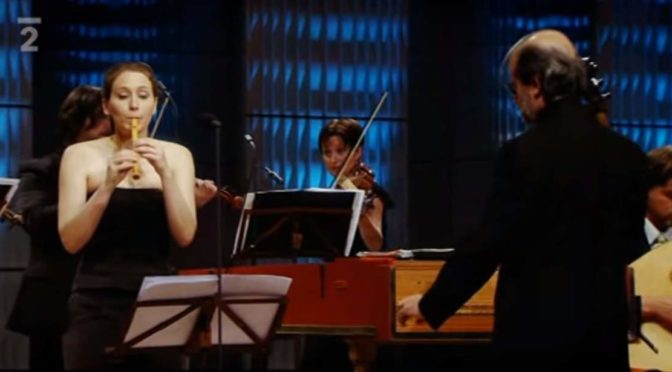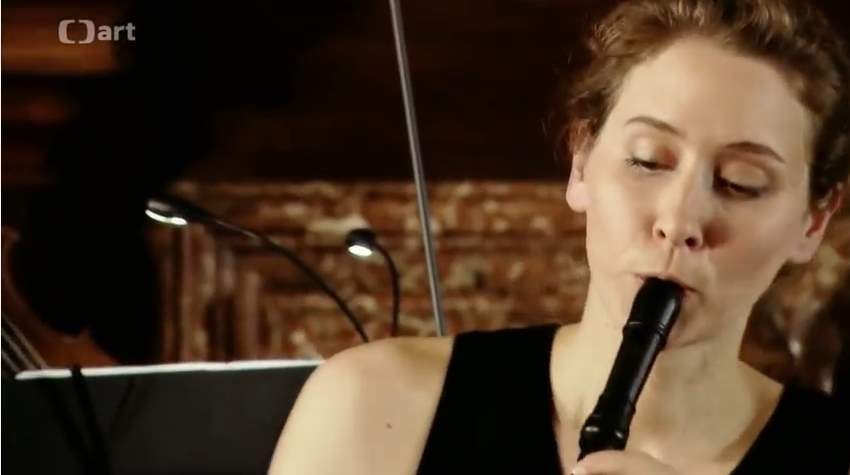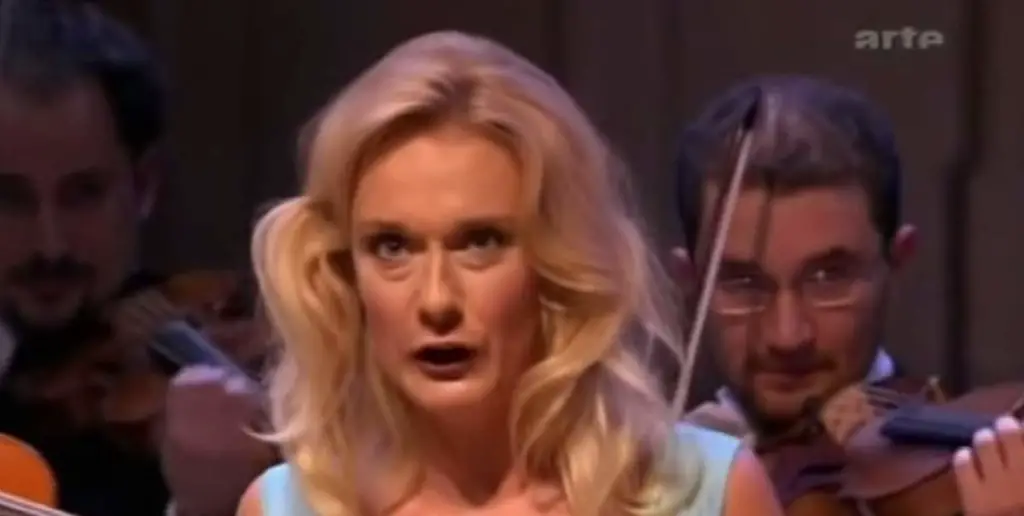Conducted by Andrea Marcon, the Czech early music orchestra and choir Collegium 1704 performs arias and concertos from the Baroque period composers George Frideric Handel, Antonio Vivaldi, and Claudio Monteverdi. Soloists (guest musicians): Magdalena Kožená, mezzo-soprano; Anna Fusek, flautino.
Programme
With the starting times in the video:
- 00:00 Vivaldi: Concerto for strings in D minor, RV 127
- 04:04 Vivaldi: Ho il cor giá lacero from Griselda
- 09:00 Handel: Scherza Infida – Ariodante
- 21:23 Vivaldi: Concerto for flautino in G major, RV 443
- 32:15 Handel: Where shall I fly – Hercules
- 39:04 Monteverdi: Si dolce è il tormento
- 43:07 Vivaldi: Solo quella guancia bella – La veritá in cimento
- 46:36 Handel: Lascia ch’io pianga – Rinaldo
Vivaldi: Concerto for strings in D minor, RV 127
Composition year: 1717, by 1736 at latest. Movements:
- Allegro
- Largo
- Allegro
Ho il cor giá lacero
Ho il cor giá lacero is an aria from Griselda, a dramma per musica in three acts that was composed by Antonio Vivaldi. It was first performed in Venice at the Teatro San Samuele on 18 May 1735.
Ho il cor già lacero
da mille affanni
empi congiurano
tutti a miei danni
vorrei nascondermi
fuggir vorrei
del cielo i fulmini
mi fan tremar.
Divengo stupida
nel colpo atroce
non ho più lagrime
non ho più voce
non posso piangere
non so parlar.
Scherza infida
Scherza infida is an aria from the opera Ariodante (HWV 33), an opera seria in three acts by George Frideric Handel. The opera was first performed in the Covent Garden Theatre, London, on 8 January 1735.
Italian Text
E vivo ancora?
E senza il ferro,
oh! Dei! che farò?
Che mi dite, o affanni miei?
Scherza infida in grembo al drudo,
io tradito a morte in braccio
per tua colpa ora men vo.
Mà a spezzar l’indegno laccio,
ombra mesta e spirto ignudo,
per tua pena io tornerò.
English translation
Do I still live?
And without a sword,
O gods! what shall I do?
What do you say, o my troubles?
Enjoy yourself, o faithless one, in the arms of your lover.
Betrayed by you,
I will now give myself up to death’s embrace.
But, in order to break this shameful tie,
a sad and bereaved spirit,
I will return to punish you.
Concerto for flautino in G major, RV 443
The concerto is in 3 movements:
I: [Allegro]
II: Largo
III: Allegro molto
Composition Year: 1728-29. Details about the composition and the first performance of this concerto are unknown. The concerto is scored for piccolo, and string orchestra supported by a continuo harpsichord.
Vivaldi’s flautino was a recorder, probably the high-pitched sopranino recorder. The piccolo, which is the equivalent member of the family of transverse flutes, only came into existence around 1730.
Where shall I fly
Where shall I fly is an aria from Hercules (HWV 60), a Musical Drama in three acts by George Frideric Handel, composed in July and August 1744. The English language libretto was by the Reverend Thomas Broughton, based on Sophocles’s Women of Trachis and the ninth book of Ovid’s Metamorphoses.
Where shall I fly? Where hide this guilty head?
O fatal error of misguided love!
O cruel Nessus, how art thou reveng’d!
Wretched I am! By me Alcides dies!
These impious hands have sent my injur’d lord
Untimely to the shades! Let me be mad!
Chain me, ye Furies, to your iron beds,
And lash my guilty ghost with whips of scorpions!
See, see, they come! Alecto with her snakes,
Megaera fell, and black Tisiphone!
See the dreadful sisters rise,
Their baneful presence taints the skies!
See the snaky whips they bear!
What yellings rend my tortur’d ear!
Hide me from their hated sight,
Friendly shades of blackest night!
Alas, no rest the guilty find
From the pursuing furies of the mind!
Solo quella guancia bella
Solo quella guancia bella is an aria from La verità in cimento (Truth in Contention), an opera by Antonio Vivaldi to a libretto by Giovanni Palazzi. The opera, Vivaldi’s 13th, was premiered during the Carnival at Venice in 1720. The work is dedicated to Count Sava Vladislavich, a Russian legate who resided in Venice from 1716 to 1722. The work is listed as RV 739 in the Vivaldi catalogue.
Solo quella guancia bella
vezzosetta, superbetta
ha il mio, la mia pietà.
Se crudele, se infedele
al tuo mesto amor son io,
giova al mio la crudeltà.
Lascia ch’io pianga
Lascia ch’io pianga is an aria from Rinaldo, an opera by George Frideric Handel, composed in 1711, and was the first Italian language opera written specifically for the London stage.
Italian Text
Lascia ch’io pianga
mia cruda sorte,
E che sospiri la libert?
E che sospiri,
e che sospiri la libert?
Lascia ch’io pianga
mia cruda sorte,
E che sospiri la libert?
Il duolo infranga
queste ritorte
de miei martiri
sol per piet?
de miei martiri
sol per piet?
Lascia ch’io pianga
mia cruda sorte,
E che sospiri la libert?
E che sospiri,
e che sospiri la libert?
Lascia ch’io pianga
mia cruda sorte,
E che sospiri la libert?
English translation
Let me weep over
my cruel fate,
And that I long for freedom!
And that I long,
and that I long for freedom!
Let me weep over
my cruel fate,
And that I long for freedom!
The duel infringes
these images
of my sufferings
I pray for mercy.
for my sufferances.
I pray for mercy.
Let me weep over
my cruel fate,
And that I long for freedom!
And that I long,
and that I long for freedom!
Let me weep over
my cruel fate,
And that I long for freedom!
Sources
- Griselda (Vivaldi) on wikipedia
- Ariodante on wikipedia
- Hercules (Handel) on wikipedia
- La verità in cimento on wikipedia
- Rinaldo on wikipedia


